THIS POST MAY CONTAIN AFFILIATE LINKS. AS AN AMAZON ASSOCIATE I EARN FROM QUALIFYING PURCHASES. PLEASE READ THE DISCLOSURE FOR MORE INFORMATION
Ever since my friend told me about the exhilarating experience of learning scuba diving, I have been dreaming about doing it too. Since then I have been eyeing getting a scuba certification, but it didn’t work out due to various reasons. After five long years, the stars finally aligned (owing to the pressure of doing something interesting on my birthday) and I thought of taking a leap to be a PADI Open Water Diver.
PADI vs SSI
As the world’s most recognized diver training organization, PADI (Professional Association of Diving Instructors) professionals are culturally diverse recreational dive professionals in the entire community. Globally, over 20 million PADI certifications have been issued. Through popular sites such as padi.com and ScubaEarth, the PADI organization reaches all corners of the world. No matter where you go, rest assured that the local dive community will recognize your diver credentials – even if “PADI” is the only word you can speak in the local language.
SSI(Scuba Schools International), on the other hand, is another diver training organization that is also well-known in different corners of the world. While PADI is more popular in Asia, SSI, on the other hand, is quite famous in Australia. Both offer similar courses and usually, they recognize the other credentials as well.
Since I went on to become a PADI Open Water diver in the Maldives – this post would be detailing about getting certified with PADI.
Read: How to Travel the Maldives on a Budget
Is it Worth it to get certified on Scuba Diving
Well, there’s no right answer here, and it depends on individual preferences. If you are going to dive frequently, and want to incorporate diving as part of your travel, then getting certified would open up more opportunities for you.
Some dive sites require you to have a prior certification, and the same goes for liveaboards too. In this case, having a certification (usually Advanced Open water diver certification) comes in handy.
Getting certified just gives you more access to the underwater world. Most beginner divers are restricted to diving up to 10 meters in depth. However, if you’re an Open water diver, you can dive up to 18 m depth.
Additionally, if you are an Advanced Open Water Diver, you can dive up to 30 m in depth. If you are enraptured by wreck diving and would like to try it out on one of your travels, being an advanced open-water diver has a real advantage. As most of the wreck dives begin at 15 m, if you’re a qualified Advanced Open water diver, then you can dive deep into the wrecks up to 30 m while Open water divers will only be able to grace the surface of the wreck (with the depth limitation of 18 m).
Take a step towards being a diver through PADI Open Water Diver certification
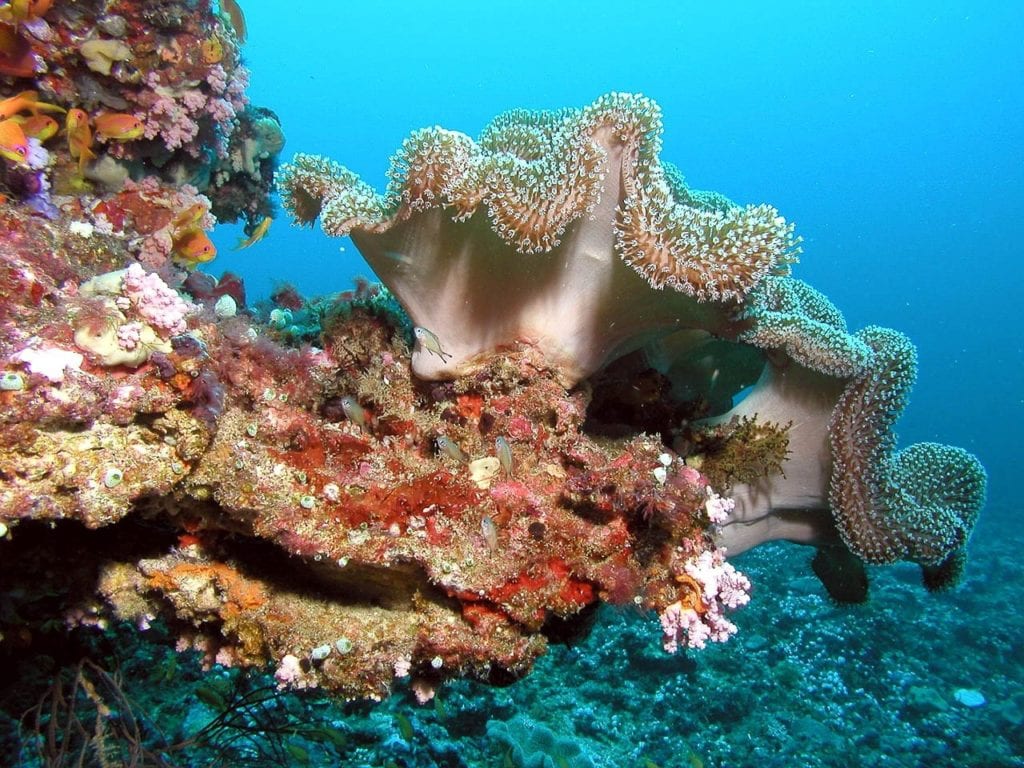
The PADI Open Water Diver certification is a full, entry-level certification you earn by successfully completing the entire course. Focussed on performance-based and student-centric learning experience.
The course involves taking a three-hour video lesson followed by confined and open water dives. Once all of this is completed, you are required to pass the written test securing at least a 70% score. Which is when you qualify to be a PADI open-water diver.
As part of the PADI Open Water course, you can go as deep as 18 meters into the ocean.
It qualifies you to
- Dive without instructor supervision while applying the knowledge and skills that you learn in this course.
- Obtain air fills, scuba equipment, and other dive services.
- Plan, conduct, and log open water dives accompanied by a buddy in conditions in which you have training or experience.
- Continue your diver training in the PADI Advanced Open Water Diver course or in PADI specialty courses.
As with any recreational sport, diving can be physically demanding. As a result, individuals who may be predisposed to heart attack or any cardiovascular disease must exercise caution. Also, you will have to fill up a medical form stating that you are fit and healthy while getting certified.
Improve your knowledge of diving
Once you register for the course, you will receive a manual that has all the relevant information needed to pass the course.
You grasp concepts of buoyancy, inflation, and deflation, SPG( Submersible Pressure Gauge), BCD(Buoyancy Control Device), and so on. Learning to equalize ears (create pressure inside the ear canal that matches that of increasing pressure from the outside) as you descend is also very crucial. The video lessons provide an in-depth overview of the problems that can arise while diving. It also explains more about responsible diving and details about diving equipment.
Tip – If you would rather spend your time outdoors than taking a three-hour video session, contact your diving centre, and request them to provide you with relevant video lesson prior to taking the trip. This will save time and you will have a good understanding of the process before you land on the location.
Learn practical aspects of diving through Confined Water Dives
Confined dives serve as a rehearsal for open water dives. It involves putting the video course lessons into practice. The instructors will teach you to dive in a confined space — usually a swimming pool or sometimes, even a shallow beach. This encompasses the practical aspects of underwater diving like inflating or deflating the BCD, breathing through the regulator underwater or equalizing the air pressure or clearing water under the mask. Grasping these concepts is essential to being able to dive underwater.
Enjoy the beautiful underwater life with PADI Open Water Dives
Open water dives are where you the real fun begins! It is usually inclusive of four dives – two dives to a maximum of 10 meters in depth and two more to a maximum of 18 meters in depth.
Disclaimer – Sometimes, new divers may experience nose bleeds and ear blocks owing to equalization problems while descending. It is important NOT to push limits while diving which might lead to serious damage. Consult with the instructors and ask them on how to proceed.
After the Open water dives, in order to complete the certification, you will have to take written exams which test knowledge on the above-mentioned topics. Once you pass the test, you are finally qualified as a PADI Open water diver.
Five things to know before you go diving
Don’t consume alcohol before diving
Consuming alcohol affects your judgment, and the repercussions may increase with depth. It also accelerates body heat loss, which can be an issue during cooler dives. Be moderate if you drinking the night before diving since it can contribute to decompression sickness risk.
Flying limitations
Due to the difference in pressure, the diving community imposes a time limit for flying after a dive. This is to abate the risk of decompression sickness.
Do not fly for at least 12 hours after a single dive. And do not fly for at least 18 hours after repetitive dives( diving every day or several days in a row).
Underwater world ambassadors
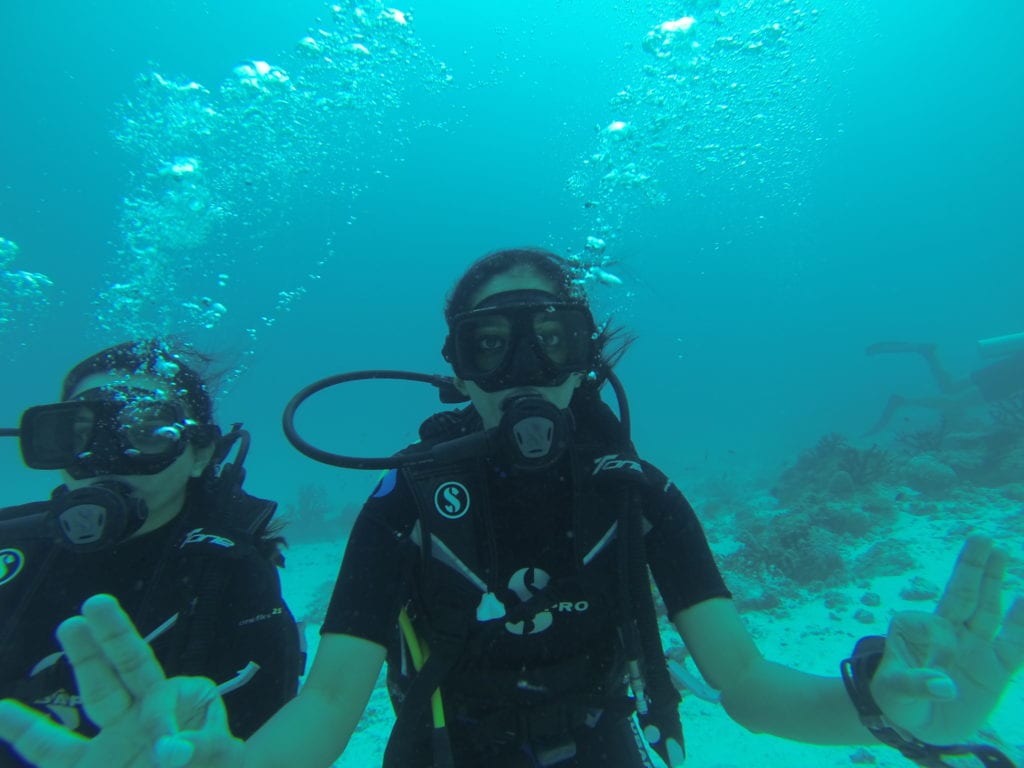
Be sensitive to the natural rhythm of the underwater world. It is always better to have passive interactions that leave aquatic life undisturbed(watching, photography). Evade active interactions( feeding, touching, chasing, and so on). Touching on corals or other marine life can be problematic to the underwater ecosystem. The vast majority of organisms pose no serious threat to divers. Most of the aquatic life injuries result from human carelessness. You can ward off most of these injuries by being alert and aware of where these organisms live and how they behave.
As a diver, you need to set a good example as the underwater world’s advocates and ambassadors.
How would future generations realize the beauty of the underwater world if there is nothing left to see!
Hand signals
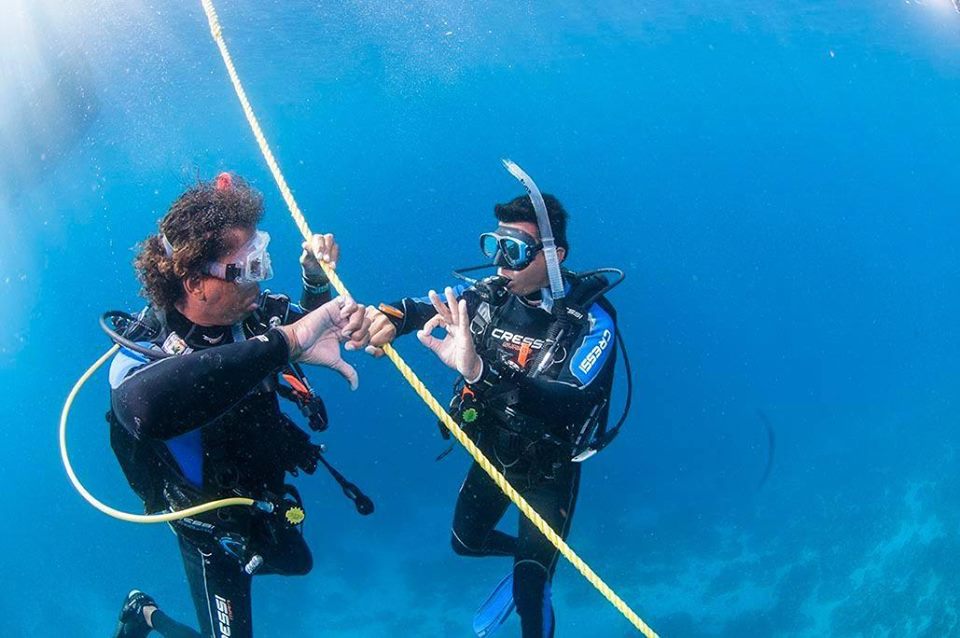
It is important to keep in mind that the objects underwater seem closer and bigger than they actually are. Henceforth, judge movements accordingly.
It is not possible to talk underwater. So, be sure to give attention to the hand signals suggested by instructors before diving.
Do not over-exert yourself while diving
It is natural to feel a slight discomfort while diving considering a change in water pressure. The air pressure changes by 1 bar every 10 meters. If you feel you cannot take it anymore underwater, it is better to resurface. Do not dive when you have a cold since it’s important to have a clear nasal passage while diving owing to water pressure. And do not overexert yourself while diving.
What next?
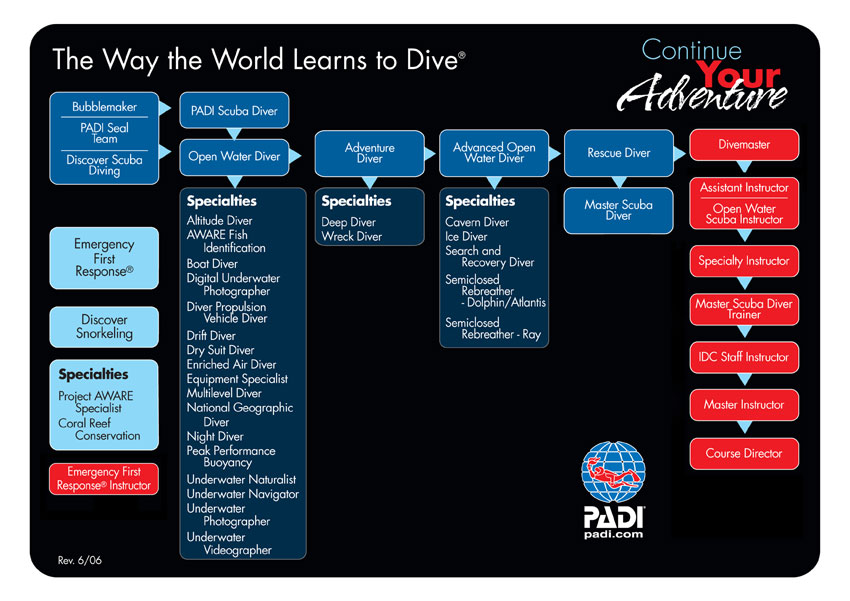
Padi flow chart
Depends on what your scuba diving goals are. If you are looking to take up scuba diving purely as a recreational sport, then you can aspire for a maximum qualification of Master Scuba Diver. However, if you fancy being a Scuba diving trainer, then you follow the same steps and take a deviation at Divemaster. That is when you can start training. The highest qualification on the training side would be a Course Director. There is only a handful of Course Directors right now at a global level. As you can see there are also numerous courses you can specialize on such as underwater photographer, night diver, Altitude diver, wreck diver, and so on.
Getting certified as a scuba diver opens you up to a new world of possibilities. Next would be to get an advanced scuba diving certification. And then I would like to start ticking off my bucket list dives in the Red Sea, Raja Ampat and Mexico. And don’t get me started on the innumerable wreck dives around the world, a majority of which requires an advanced scuba certification.
Bonus: Here’s a video from the underwater world of Maldives. Prepare to be hooked! Find more videos on the Facebook Channel.
Cultivate a Diving lifestyle
Apart from the courses above, there are many ways to cultivate a diving lifestyle
- Join and participate in your local dive center’s dive club or social events and log onto ScubaEarth. You would need to have a PADI ID in order to register here. Diving is a social activity, it is fun to do it in a group.
- Sign up for a dive trip that involves travel, or plan a local dive.
- Invest in scuba equipment – BCD, regulator, dive computer, wetsuit/dry suit.
- Take part in a local environmental project or event.
Note – You won’t be able to swim in a traditional sense per se, while diving. But emergency situations might compel you to swim which is why you have to know swimming while you are getting certified as a PADI Open water diver. Also, it is imperative to not be afraid of water. There are already a variety of things to do on your own underwater especially while getting certified. Adding the fear of water into this can get pretty overwhelming.
It is essential to remain calm and composed while diving.
Getting panicked can be a very risky business underwater.
And, NO, a PADI open-water diver is not qualified to teach you scuba diving. Moreover, without the gears and the equipment, it is practically of no use. You have to contact a well-accredited dive school or a dive resort to get certified(Usually PADI or SSI).
Shopping list
Natural Sunscreen
Did you know that just one drop of sunscreen in 3.9 million gallons(15 million liters) of water is all it takes to damage a reef? Sunscreen is a necessity for most scuba divers, but not all sunblock are created equal. You might inadvertently be contributing to destroying coral reefs around the world. Choose a natural sunscreen that isn’t harmful to the environment or just cover up rather than slathering on. Read more about it in the PADI blog.
Swimming caps
Braid your hair if possible or use a hair band. Prefer lycra spandex swim caps over silicone ones for comfort.
 Swimwear
Swimwear
The dive shops provide wetsuits in tropical climates and dry suits in cold climates. However, buy a good swimwear to wear underneath.
So, are you thinking of being a PADI open water diver or have you got any scuba certification under your belt?
Let me know in the comments below.
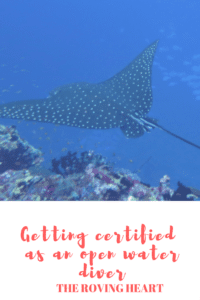



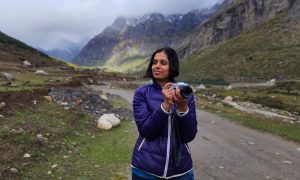


Comments
14 CommentsMaxine
Nov 9, 2017Great post, so much helpful information. I would love to learn how to scuba dive, especially for seeing tropical fish and gorgeous coral. I had absolutely no idea about the sunscreen, thanks for the informative post.
Raksha Rao
Nov 13, 2017Happy to hear that Maxine 🙂
leecetraveler
Nov 9, 2017This was a great post with a lot of really helpful and informative details. I am a divemaster and have been scuba diving for almost 10 years. It is an amazing way to see some of the most beautiful parts of nature.
Raksha Rao
Nov 13, 2017Wow. That’s amazing. Definitely! There is a whole different world out there 🙂
TravellingDany
Nov 9, 2017My brother in law us a certified water diver too and he loves it. Just like you, he thinks that it’s important to find a professional organization that you can trust!
sabrinatrevis
Nov 9, 2017Well, I don’t really agree with “It is not necessary to know swimming while you are getting certified.” If someone doesn’t know how to swim I won’t recommend diving at all! To get your PADI you need to have a lot of confidence in open water with possibly great depths and currents.
Raksha Rao
Nov 13, 2017What I meant to say is that Scuba diving doesn’t really involve swimming. The gears take care of diving underwater. It is necessary however to not have fear of water. Few of my friends who don’t know swimming have done scuba diving and moreover got themselves certified as Open water divers 🙂
Rajlakshmi
Nov 9, 2017I am not a good swimmer and had a really bad time when i tried to snorkel. Hopefully, I would be able to scuba dive. Love your detailed post.
Linda de Beer
Nov 9, 2017My best friend did a scuba diving course when we were at university but the thought always terrified me. I only went along to the beach for the party! It looks like you’re in good hands with a PADI professional. I may have reconsidered if they were around in South Africa at the time.
This Epic World
Nov 10, 2017Wow! I never knew about the sunscreen fact! This is saddening. I wish more people paid attention to little things like this. Even a small effort from one’s side can make so much difference.
Raksha Rao
Nov 13, 2017I agree. It is always good to educate yourself about these things. Sometimes, we harm the environment just by being apathetic towards it.
Orca
Feb 10, 2024The article on obtaining PADI Open Water certification is insightful and well-detailed. As someone interested in scuba diving, I appreciate the breakdown of the course structure and the emphasis on safety and skill development. The author’s personal experience adds authenticity and encourages readers to pursue their passion for underwater exploration. This comprehensive guide serves as a valuable resource for anyone considering enrolling in PADI Open Water courses. Overall, it’s an engaging read that motivates aspiring divers to take the plunge and embark on an unforgettable journey beneath the waves.
Orca
Mar 23, 2024This article on open water scuba diving certification offers valuable insights into the thrilling world of underwater exploration. The author provides comprehensive details about the course, from prerequisites to certification. It’s a compelling read for anyone considering taking up scuba diving. The information shared is clear and informative, making it an excellent resource for beginners.
Orcadiveclub
May 17, 2024Open water scuba diving certification is incredibly informative! The detailed steps and personal insights make it a valuable resource for anyone considering getting certified. A must-read for aspiring divers looking to embark on their underwater adventures with confidence!